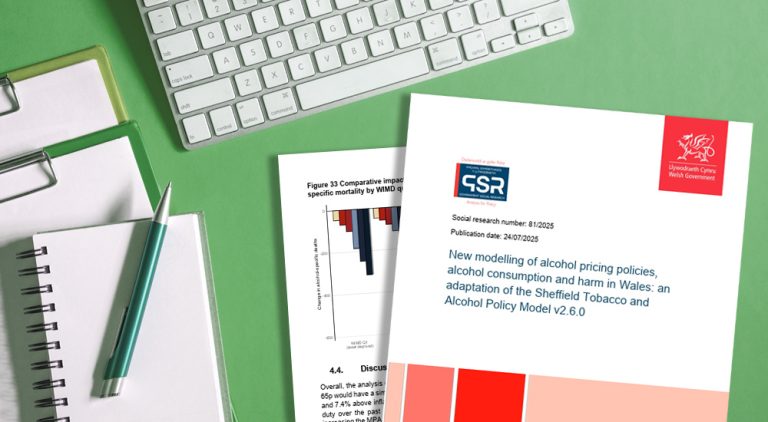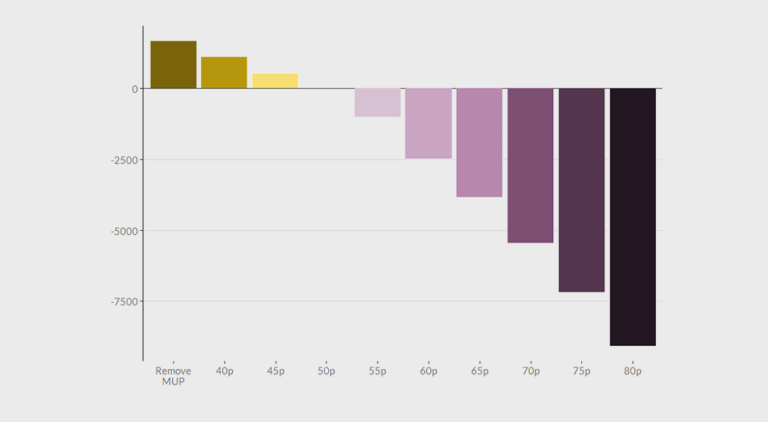Modelling
The Sheffield Addictions Research Group uses computer modelling and simulation to evaluate policies, predict behaviour and identify trends.
Introduction
The Sheffield Addictions Research Group uses a range of modelling techniques to inform policy decisions and public health interventions. We specialise in several modelling approaches, including:
- Cost-effectiveness modelling: We evaluate the economic impact of different interventions and policies, with the aim of identifying the most cost-effective ways to reduce harms from alcohol, tobacco, gambling and other addictive behaviours.
- Policy analysis and evaluation: We use modelling to assess the potential impact of proposed policies, ensuring that evidence-based decisions are made.
- Agent-based modelling: This technique allows us to simulate the behaviour of individuals within a population, helping us to understand how factors like social networks and environmental influences can impact addiction patterns.
- Trends and patterns analysis: We identify trends in behaviours and health outcomes, enabling us to predict future challenges.
The Sheffield Tobacco and Alcohol Policy Modelling Platform
The Sheffield Tobacco and Alcohol Policy Modelling Platform (STAPM) is a comprehensive and flexible modelling resource designed to assess the potential health and economic impacts of tobacco and alcohol policies. Since the inception of the Sheffield Alcohol Policy Model (SAPM) in 2008, the platform has undergone extensive development and has been instrumental in numerous policy decisions including the introduction of Minimum Unit Pricing in Scotland.
Agent-based modelling
Our experts in the Department of Automatic Control and Systems Engineering have received funding from the USA's National Institute on Alcohol Abuse and Alcoholism (NIAAA) to develop new computer models of alcohol use through the CASCADE and SIMAH projects. New agent-based modelling for tobacco is also being developed through a research programme funded by Cancer Research UK.
Gambling
PhD student and SARG Research Associate Esther Moore is developing the first public health economic model of gambling which aims to estimate the potential impact of a ban on gambling advertisements on TV.
Talk to our experts
To discuss our modelling work drop us a line at sarg@sheffield.ac.uk and we'll get back to you as soon as we can.
Research involving modelling
-
New research shows that spending less on tobacco, gambling and sweets is good for the UK economy
A new study from the Sheffield Addictions Research Group (SARG) has found that public health policies which reduce spending on harmful products can actually provide a significant boost to UK jobs and the wider economy.
-
SARG researchers present on economic modelling and wastewater surveillance at European Public Health Conference
Two researchers from the Sheffield Addictions Research Group (SARG), Dr Charlotte Head and Dr Esther Chanakira, will showcase innovative local-level tools for policy design, including economic modelling and wastewater surveillance, at the European Public Health (EPH) Conference in Helsinki from 11–14 November 2025.
-
SARG researcher secures major Wellcome funding to model how context influences alcohol consumption
Dr Amber Copeland from the Sheffield Addictions Research Group (SARG) has been awarded a prestigious Wellcome Trust fellowship worth £591,755 over five years. The funding will support a new project to develop a cutting-edge computational model that explores how a person's environment influences their attempts to cut down on alcohol.
-
A novel interdisciplinary approach to understanding how contextual factors influence alcohol consumption
This project will develop a novel modelling infrastructure to advance our understanding of how contextual factors influence alcohol reduction attempts and inform policy interventions addressing alcohol-related harm.
-
New report on minimum unit pricing for alcohol in Wales
The Sheffield Addictions Research Group (SARG) has published a major new report that models the impact of alcohol pricing policies on alcohol consumption and harm in Wales.
-
SARG releases first Budget briefing report
The Sheffield Addictions Research Group has launched an ongoing series of Budget Briefing Notes exploring the potential health and economic consequences of tobacco and alcohol tax changes, beginning with the Autumn 2024 Budget.
-
Budget Briefing Notes
Our rapid-response reports use the Sheffield Tobacco and Alcohol Modelling Platform to offer timely analysis of the potential implications of changes to alcohol and tobacco taxation following UK Government Budget announcements.
-
SPIRE
'Scoping of Policy Impacts for Regulating E-cigarettes (SPIRE): a data and decision analytic model mapping project' aims to learn what type of research about vapes would be most useful for policy making, what data already exists to go into this type of analysis and what new data are needed.
-
SARG study on UK alcohol tax reforms published in The Lancet Public Health
A new study published this week in The Lancet Public Health by the Sheffield Addictions Research Group shows that while recent reforms to UK alcohol taxation are a step in the right direction, they are unlikely to significantly improve public health outcomes without further changes.
-
STAPM
The Sheffield Tobacco and Alcohol Policy Modelling Platform (STAPM) research programme aims to identify and evaluate approaches to reducing the harms caused by tobacco and alcohol consumption. By providing policymakers with evidence-based insights, STAPM seeks to improve public health policymaking and commissioning.
-
SIMAH
The SIMAH project investigates the link between alcohol use and life expectancy, with a focus on socioeconomic status and race/ethnicity as modifying factors.
-
Targeting multiple levels of 'the smoking cessation system' using novel scientific approaches
This programme will develop and apply novel scientific approaches to increase the population rate of smoking cessation.
-
SPECTRUM
The SPECTRUM Consortium is a multi-university, multi-agency research consortium focused on the commercial determinants of health and health inequalities, funded by the UK Prevention Research Partnership.
-
Online seminar on behavioural theory and tobacco modelling
Modelling work on tobacco initiation and cessation was the subject of a recent online seminar for Behavioural Research UK.
-
CASCADE
The CASCADE project aimed to develop new computer models of alcohol use which draw on existing theories for why people drink and sought novel combinations of these theories in order to better explain the changes in alcohol use we observe in society.
-
New modelling of alcohol harms in Scotland
The Sheffield Alcohol Research Group has today (20 September 2023) published a major new report on the impact of alcohol pricing policies, alcohol consumption and harm in Scotland.
-
Evaluating the impact of minimum unit pricing in Scotland on harmful drinkers
This project evaluated the impact of Scotland's minimum unit pricing (MUP) policy on people drinking at harmful levels, including those with alcohol dependence.
-
Does minimum pricing reduce the burden of disease and injury attributable to alcohol in Canada?
This research used the Sheffield Alcohol Policy Model to estimate the potential effects of minimum unit pricing (MUP) for alcohol on consumption, spending, and alcohol-related harm in Wales, including health, crime, and absenteeism.
-
Modelling the impact of minimum unit pricing for alcohol in Scotland
Since 2009 the Sheffield Addictions Research Group has undertaken a number of modelling projects for the Scottish Government to appraise the impact of minimum unit pricing (MUP) for alcohol.
-
Modelling the impact of minimum unit pricing for alcohol in Wales
This research used the Sheffield Alcohol Policy Model to estimate the potential effects of minimum unit pricing (MUP) for alcohol on consumption, spending, and alcohol-related harm in Wales, including health, crime, and absenteeism.
-
Appraising the effect of implementing local minimum unit pricing on alcohol consumption and health in the North West of England
This project aimed to provide evidence about what would happen if minimum unit pricing (MUP) for alcohol was introduced by local authorities in North West England.
-
SAPM
The Sheffield Alcohol Policy Model (also known as SAPM) provides estimates of the health and economic impacts of a broad range of alcohol policies as well as how these impacts vary across different groups in the population.
-
ODHIN
Optimising Delivery of Healthcare Interventions (ODHIN) was an EU-wide project focusing on understanding how best to translate the results of clinical research into everyday primary health care.
-
Interdisciplinary Alcohol Policy Research Programme
The overarching aim for this ambitious programme of research was to lead a step-change in capabilities for robust scientific appraisal of new and existing alcohol policy interventions by substantially developing and updating the Sheffield Alcohol Policy Model.























